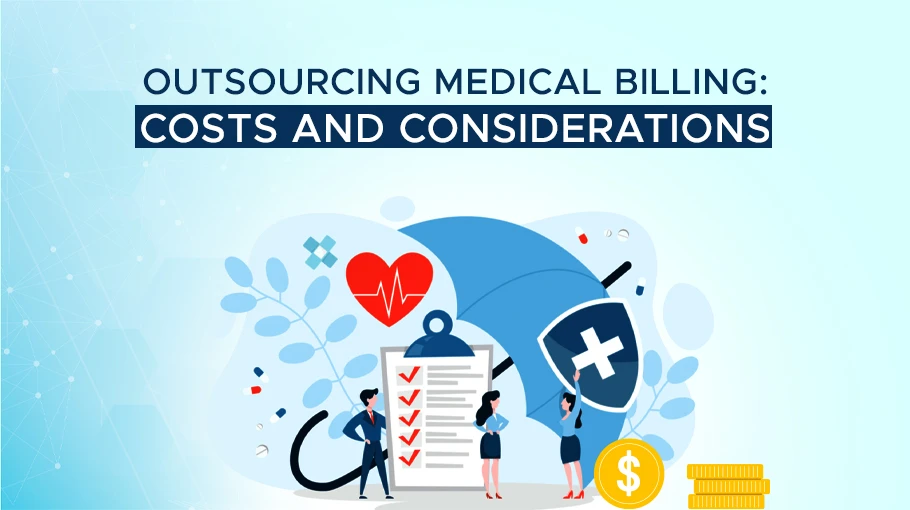As healthcare providers and medical professionals across the spectrum of specialties continue seeking ways to streamline operations and reduce costs, medical billing is one area receiving significant attention. This comprehensive guide will delve deep into the costs and considerations of outsourcing medical billing, a move that could potentially revolutionize your practice’s operations.
The State of Medical Billing in the United States
Before we delve into the specifics of outsourcing, let’s establish some context. Medical billing is an important part for any healthcare provider, involving tracking patient encounters, coding services, and submitting and following up on claims with health insurance companies. It’s a complex process fraught with potential pitfalls. The American Medical Association (AMA) reported that physicians spend an average of nearly 15 hours per week on billing-related tasks, significantly detracting from patient care.
The Appeal of Outsourcing Medical Billing
Outsourcing medical billing allows practices to shift this time-consuming and specialized responsibility to medical billing experts in the field, freeing up healthcare providers to focus on their core competency: patient care. Research shows that outsourced medical billing can reduce errors and increase revenue collection by as much as 10%.
The Costs of Outsourcing Medical Billing
Healthcare providers must take a deep dive into the financial implications of such a move when deciding whether to outsource medical billing. It is essential to understand that the costs associated with outsourcing are not uniform and can vary significantly based on several factors.
Factors Influencing the Cost
Size of the Practice: Larger practices with a high patient volume tend to have more billing transactions. As a result, they might need to pay more for the medical billing service.
The volume of Billing: The total amount of billing transactions also influences the cost. More transactions usually mean higher prices.
The complexity of Services: Specialized practices, such as cardiology or neurology, often require more complex coding and billing processes. As a result, they might incur higher costs when outsourcing their medical billing.
The Price Tag: How Much Does It Cost?
According to a comprehensive study by the Medical Group Management Association (MGMA), the cost of outsourcing medical billing typically ranges between 4% and 9% of a practice’s monthly collected revenue. This fee pays for tracking patient encounters, coding services, submitting claims to insurance companies, and following up on these claims.
If your practice collects $500,000 a month in revenue, you can expect to pay between $20,000 and $45,000 monthly for a medical billing service.
While these figures provide a ballpark estimate, it’s crucial to remember that each medical billing company has its pricing structure. Some may charge a flat fee per claim, while others charge a percentage of the collected revenue.
The decision to outsource medical billing should not be taken lightly. While it can offer significant benefits like reduced errors and increased revenue collection, it comes with a cost. Healthcare providers need to thoroughly analyze these costs relative to their practice’s specific needs and financial health before making a decision. Only then can a practice ensure it’s making the most financially sound decision for its future.
Choosing the Ideal Medical Billing Service
The decision to outsource medical billing is a significant one. Equally crucial is selecting the right service provider. It’s not just about cost; numerous other factors come into play. A reputable company that aligns with your specialty, has a proven track record and can provide references from satisfied clients should be at the top of your list. When selecting your practice’s ideal medical billing service, let’s explore some key considerations.
Reputation and Specialty Experience
A company’s reputation in the medical billing industry is vital. Look for providers with a history of reliability and integrity. They should be able to demonstrate a strong track record with practices similar to yours in size and specialty. A company familiar with your specialty will be more adept at navigating your practice’s unique coding and billing challenges.
References and Reviews
Solid references from satisfied clients are invaluable—request contacts from the billing company’s current or past clients who share your specialty. Reviews can also provide insights into the company’s strengths and weaknesses and give you a better idea of what to expect.
Coding Accuracy
Medical coding errors can lead to claim denials, delayed payments, and a significant loss of revenue. Therefore, a high coding accuracy rate is paramount. Ensure the billing service employs certified medical coders knowledgeable in the latest coding practices and guidelines.
Turnaround Time
The speed at which a medical billing service processes claims can significantly impact your practice’s cash flow. Faster claim submission and follow-up can lead to quicker payments from insurance companies.
Customer Service
Exceptional customer service is non-negotiable. Your medical billing service should be responsive to your needs and concerns, provide comprehensive reports regularly, and be willing to explain any aspect of the billing process you’re unsure about.
Cost
While not the only consideration, the cost of the service is, of course, vital. Carefully consider the pricing structure and ensure it aligns with your budget and financial expectations.
Selecting the exemplary medical billing service is a strategic decision that can influence your practice’s operational efficiency and financial health. It’s vital to take a comprehensive approach, considering the company’s reputation, specialty experience, references, coding accuracy, turnaround time, customer service, and cost. By doing so, you can ensure that the service you choose aligns with your practice’s needs and contributes positively to your bottom line.
The Transition to Outsourced Medical Billing
Making the shift from in-house to outsourced medical billing can seem daunting. It’s a process that requires careful planning, clear communication, and comprehensive staff training. However, the transition can be smoother than you might anticipate with the right approach and a keen eye on compliance.
Careful Planning
The first step is creating a detailed transition plan. This should outline critical milestones, deadlines, and responsibilities. A well-structured plan helps ensure a seamless transition with minimal disruption to your practice’s operations.
Clear Communication
Transparent communication is critical throughout the transition. Ensure all staff members understand why the change is happening, the new processes, and how it will affect their roles. An open dialogue helps alleviate potential concerns and encourages team members to engage in the transition process fully.
Comprehensive Staff Training
Staff training is vital to ensure everyone is comfortable with the new system. Your outsourced medical billing provider should offer comprehensive training sessions to educate your team on interacting with the new system and handling billing-related inquiries.
Compliance
A paramount concern is ensuring the billing service fully complies with Health Insurance Portability and Accountability Act (HIPAA) regulations and other relevant healthcare laws. Non-compliance could result in significant fines and damage to your practice’s reputation.
The Long-Term Impact of Outsourcing Medical Billing
While transitioning to outsource medical billing might entail upfront costs and a steep learning curve, the long-term benefits can be substantial.
Fewer Billing Errors
One of the most immediate benefits is a reduction in billing errors. Professional medical billing services employ experts proficient in medical coding and familiar with the latest changes in healthcare regulations. This expertise can lead to fewer billing errors and increased claim approvals.
Faster Reimbursements
Billing services typically process claims faster and more accurately, leading to quicker reimbursements. This can improve your practice’s cash flow, significantly impacting your bottom line.
Improved Operational Efficiency
Outsourcing the complex task of medical billing frees up your healthcare providers to focus on what they do best: patient care. This can lead to improved operational efficiency and patient satisfaction.
Conclusion
Outsourcing medical billing is a significant decision for any healthcare practice. While the costs can be considerable, the potential benefits —increased revenue and improved patient care — are compelling. Careful consideration, thorough research, and thoughtful planning can help ensure that the transition to outsourced billing is a positive and beneficial move for your practice.
Remember, every practice is unique. What works for one may not work for another. Therefore, it’s crucial to conduct a thorough cost-benefit analysis before deciding. As the healthcare landscape evolves, practices must remain flexible and open to innovative strategies like outsourcing medical billing to maintain their competitive edge and provide the highest quality care to their patients.




